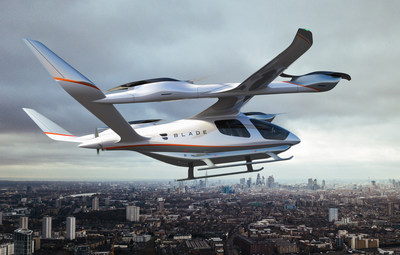BETA inks deal to secure first 20 passenger Electric Vertical Aircraft (EVA) for Blade
BETA Technologies has signed a binding agreement with Blade Urban Air Mobility to secure up to 20 Electric Vertical Aircraft (EVA), marking Blade as BETA's first passenger service customer. This follows UPS's recent purchase agreement for up to 150 BETA EVAs. The ALIA aircraft can carry six passengers, has a range of 250 nautical miles, and offers a quiet, low-emission flying experience. Deliveries are set to begin in late 2024. BETA's commitment to sustainability involves the world's largest aircraft charging network, supporting their goal of reducing aviation emissions.
- Blade Urban Air Mobility becomes BETA's first passenger service partner, securing up to 20 passenger-configured ALIA EVAs.
- BETA's ALIA aircraft can carry six passengers with a 250 nautical mile range, enhancing its marketability.
- UPS has announced a purchase agreement for up to 150 BETA EVAs, indicating strong demand.
- BETA's aircraft are designed for zero operational emissions, contributing to sustainability efforts.
- None.
Insights
Analyzing...
SOUTH BURLINGTON, Vt., April 13, 2021 /PRNewswire/ -- BETA Technologies ("BETA" or "the Company") and Blade Urban Air Mobility ("Blade") today announced a binding agreement through which Blade will secure up to 20 BETA Electric Vertical Aircraft ("EVA"), becoming the Company's first passenger service customer. Today's news comes on the heels of last week's announcement by UPS that it would buy up to 150 BETA EVA aircraft, plus charging stations, as part of that company's long-term solution to reducing greenhouse gas emissions.
Founded in 2017, BETA and its team of aerospace engineers are building an electric powered ecosystem for aviation, the heart of which is ALIA, the electric vertical takeoff and landing aircraft that can carry up to six people or three standard cargo pallets. BETA's emphasis on simplicity, efficiency and sustainability has led to a pioneering electric aircraft design and the world's largest aircraft charging network. BETA's customers are in the key aerospace markets of Logistics, Medical, Defense and, now, Passenger.
"Blade is flying people in and out of cities every day, and we're excited to partner together with the leader in UAM to create a new paradigm in passenger aviation," said Kyle Clark, BETA's founder and CEO. "BETA is a pragmatic company building pragmatic aircraft. It's clear that the simplicity of our approach, strength of our technology, consistent progress against our timelines as well as the expertise of our team resonates with the best operators in the world. We are extremely excited to partner with Blade and serve the passenger mission"
Blade founder and CEO Rob Wiesenthal said, "Blade is laser-focused on its transition from conventional rotorcraft to Electric Vertical Aircraft. The ALIA's extremely low sound footprint coupled with its zero emissions design will enable us to reduce the noise and environmental impact to the communities surrounding the existing heliport and airport infrastructure we currently use. ALIA is a full-scale EVA flying in piloted configuration almost every day. The team's progress is formidable. BETA's scheduled delivery beginning in 2024 is ahead of our current projected deployment of EVA in 2025. The transaction, consistent with our asset-light operating model, allows Blade to leverage our significant flight volumes and third-party financing relationships to support the purchase of BETA aircraft by our operator partners."
Expanding Customer Base
With today's news, Blade Urban Air Mobility becomes BETA's first passenger service partner, securing up to 20 of the first passenger-configured ALIA EVAs for purchase by its network of operators and third-party financing partners, with delivery scheduled to begin in late 2024. BETA's ALIA aircraft will have a 250 nautical mile range with a cruising speed of up to 170 miles per hour. Blade's service with ALIA will begin on select routes using Blade's existing private terminal infrastructure. These aircraft will be deployed for a diverse set of mission profiles to and from city centers across multiple geographies.
In addition to today's passenger service news, BETA's technological capability across commercial, defense and cargo applications has been validated by a diverse customer mix.
- BETA's first customer and partner, United Therapeutics, will rely on BETA's aircraft to deliver organs for human transplantation.
- Last week, UPS announced it reserved the right to purchase 150 of BETA's aircraft, with the first 10 to be delivered beginning in 2024. UPS also purchased BETA's charging stations as part of an integrated solution.
- The United States Air Force continues to participate in the BETA flight test campaigns as a part of its innovative USAF Agility Prime program, which marshals government resources to accelerate commercialization of air mobility vehicles.
ALIA: Simple, Clean, Quiet
BETA's ALIA aircraft includes a novel combination of elements that create a smooth, quiet flying experience, with applications for moving both people and cargo, all while producing zero operational emissions. ALIA will be capable of flying 250 nautical miles on a single charge and carrying six people or three standard cargo pallets and a pilot. Charging will be completed in less than 50 minutes. While flying, the aircraft will be more than 10x quieter than a helicopter, imperceptible over normal urban noise and quieter than cars on a highway.
BETA's Commitment to Sustainability and an Electric Aviation Ecosystem
The aviation industry currently accounts for nine percent of global greenhouse gas emissions, and is forecasted to account for the majority by 2035 if companies like BETA don't make a meaningful dent in aircraft emissions. With Blade and others in the transportation and logistics companies pledging to reach net zero emissions within the next 20 years, BETA's aircraft offer a clear path to achieving these goals.
BETA is focused on sustainability. The Company is building not only a zero operational emissions aircraft, but a full electric powered aviation ecosystem.
- BETA has the largest aviation charging network in the world, extending throughout the northeast United States, and sites are underway across America, with plans to expand it rapidly. These high-speed charging stations allow aircraft to charge at airports, or land on an elevated deck and charge while crew and passengers access a lounge below, complete with work space and sleeping accommodations. Recharging takes less than an hour and can be accomplished in both on- and off-airport locations.
- BETA has developed immersive flight simulators, located in Burlington, VT, Washington, D.C. and Springfield, OH, and a curriculum to train pilots on electric powered aircraft, to match an anticipated surge in demand.
About BETA
BETA has built a strikingly simple Electric Vertical Aircraft ("EVA") platform with a direct path to Part 23 FAA certification. Pragmatism motivates BETA's emphasis on simplicity. The Company's first goal is safety, ALIA is serviced by elegant redundancy, appropriate diversity of implementation and simplicity of control. ALIA is an inherently stable aircraft with fixed pitch propellers and centralized batteries.
The team powering BETA's progress is deep and experienced. Clark, BETA's founder, has accumulated hundreds of flight hours in over 250 EVA flights. As a company, BETA has completed a comprehensive full-scale, all electric and manned flight test campaign. BETA's team consists of engineers who have worked at some of the world's leading technology companies and organizations including the Federal Aviation Administration, Boeing, Tesla, SpaceX, Lockheed Martin and General Electric.
About Blade
Blade Urban Air Mobility ("Blade") is a technology-powered urban air mobility platform committed to reducing travel friction by providing cost-effective air transportation alternatives to some of the most congested ground routes in the U.S. and abroad. Today, the company predominantly uses helicopters and amphibious aircraft. Its asset-light model, coupled with its exclusive passenger terminal infrastructure, is designed to facilitate a seamless transition to Electric Vertical Aircraft ("EVA" or "eVTOL", as referred to by industry), enabling lower cost air mobility to the public that is both quiet and zero emissions.
Blade recently announced it would become a public company via a merger with special purpose acquisition company Experience Investment Corp. (NASDAQ: EXPC). Closing of the merger is subject to approval by the stockholders of both Blade and Experience Investment Corp. and the satisfaction or waiver of certain other conditions.
For more information, visit www.blade.com.
![]() View original content to download multimedia:http://www.prnewswire.com/news-releases/beta-inks-deal-to-secure-first-20-passenger-electric-vertical-aircraft-eva-for-blade-301267523.html
View original content to download multimedia:http://www.prnewswire.com/news-releases/beta-inks-deal-to-secure-first-20-passenger-electric-vertical-aircraft-eva-for-blade-301267523.html
SOURCE BETA Technologies








